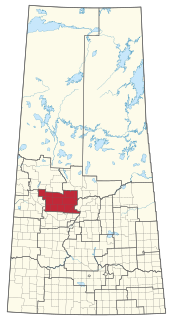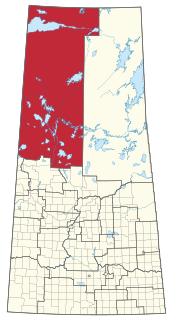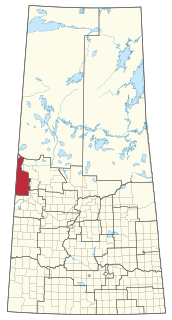Elwin Norris Hermanson is a Canadian politician, best known for being the first full-time leader of the Saskatchewan Party.

Battlefords—Lloydminster is a federal electoral district in Saskatchewan, Canada, that has been represented in the House of Commons of Canada since 1997.

Saskatoon—Rosetown—Biggar was a federal electoral district in Saskatchewan, Canada, that was represented in the House of Commons of Canada from 1997 to 2015.

Rosthern-Shellbrook is a provincial electoral district for the Legislative Assembly of Saskatchewan, Canada. This constituency was created by the Representation Act, 2002 (Saskatchewan) out of the districts of Rosthern, Shellbrook-Spiritwood, and Redberry Lake.

Athabasca is a provincial electoral district for the Legislative Assembly of Saskatchewan, Canada. It is located in the extreme northwest corner of the province. The major industries are tourism, mineral extraction, forestry, commercial fishing and trapping. The Cluff Lake uranium mine is located in this constituency, as well as the Athabasca Sand Dunes Provincial Park and the Clearwater River Provincial Park. The major communities are La Loche, Île-à-la-Crosse and Buffalo Narrows with populations of 2,136, 1,268 and 1,137 respectively.

Cut Knife-Turtleford is a provincial electoral district for the Legislative Assembly of Saskatchewan, Canada. Located in northwest Saskatchewan, this constituency has an economy based primarily on farming – while oil and gas development is rising. The Battlefords Provincial Park is located here. Communities in the riding include the towns of Cut Knife, Maidstone (1,037), Lashburn (914), and Turtleford (461); and the villages of Neilburg, Meota, Glaslyn, Marsden, and Edam.

Kelvington-Wadena is a provincial electoral district for the Legislative Assembly of Saskatchewan, Canada, in the east-central region. It was created in 1975 from Wadena and Kelvington.

Rosetown-Elrose is a provincial electoral district for the Legislative Assembly of Saskatchewan, Canada. The largest community is Rosetown with a population of 2,277. Smaller communities in the district include the towns of Outlook, Elrose, Kyle, Zealandia, and Eston; and the villages of Dinsmore, Harris, Beechy, Lucky Lake, and Conquest.

Lloydminster is a provincial electoral district for the Legislative Assembly of Saskatchewan, Canada. The district was originally created for the 1908 election. The constituency was reconstituted by the Representation Act, 1994 (Saskatchewan), mostly out of the former district of Cut Knife-Lloydminster and parts of Meadow Lake, Turtleford and Redberry.
Rosetown—Biggar was a federal electoral district in Saskatchewan, Canada, that was represented in the House of Commons of Canada from 1935 to 1968.
Battleford—Kindersley was a federal electoral district (riding) n Saskatchewan, Canada, that was represented in the House of Commons of Canada from 1968 to 1979.
Saskatoon—Biggar was a federal electoral district in Saskatchewan, Canada, that was represented in the House of Commons of Canada from 1968 to 1978.
The Battlefords—Meadow Lake was a federal electoral district in Saskatchewan, Canada, that was represented in the House of Commons of Canada from 1979 to 1997.
Battleford-Cut Knife was a provincial electoral district for the Legislative Assembly of Saskatchewan, Canada. This constituency was created by the merging of parts of the Cut Knife-Lloydminster and The Battlefords electoral districts before the 1995 Saskatchewan general election. The Representation Act, 2002 (Saskatchewan) redistributed this riding into the Cut Knife-Turtleford and a revived The Battlefords electoral districts for the 2003 Saskatchewan general election.
Biggar is a former provincial electoral division for the Legislative Assembly of the province of Saskatchewan, Canada, centred on the town of Biggar. This district was created before the 3rd Saskatchewan general election in 1912. The riding was dissolved and combined with the Rosetown district to form Rosetown-Biggar before the 23rd Saskatchewan general election in 1995. It was the constituency of Premier Woodrow S. Lloyd.
Elrose was a provincial electoral district for the Legislative Assembly of the province of Saskatchewan, Canada. Located in southwestern Saskatchewan, this constituency was centred on the town of Elrose. The riding was created before the 3rd Saskatchewan general election in 1912 as "Eagle Creek"; it was renamed "Elrose" in 1917.
Hanley is a former provincial electoral division for the Legislative Assembly of the province of Saskatchewan, Canada, centred on the town of Hanley, Saskatchewan. This district was created before the 2nd Saskatchewan general election in 1908. The riding was dissolved and combined with the Arm River, Rosthern, Kinistino, Saskatoon Buena Vista, Saskatoon Eastview, Saskatoon Sutherland and Biggar districts before the 18th Saskatchewan general election in 1975.
Redberry was a provincial electoral district for the Legislative Assembly of the province of Saskatchewan, Canada, centred on the town of Hafford. This constituency was one of 25 created before the 1st Saskatchewan general election in 1905. Dissolved in 1934, the district was reconstituted before the 9th Saskatchewan general election in 1938, and renamed "Redberry Lake" in 1995.
Wilkie was a provincial electoral district for the Legislative Assembly of the province of Saskatchewan, Canada, centered on the town of Wilkie, Saskatchewan. Created as "Tramping Lake" before the 3rd Saskatchewan general election in 1912, this constituency was renamed "Wilkie" in 1917.








